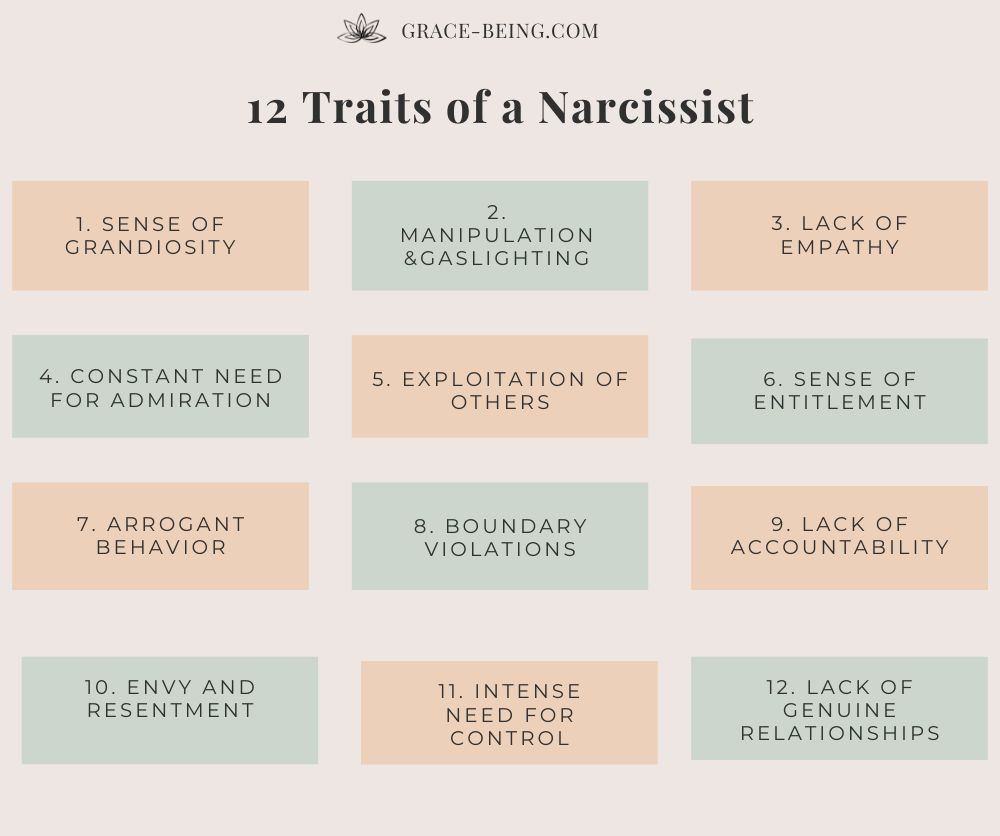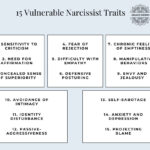12 Traits of a Narcissist | Unveiling Narcissist Characteristics and Qualities
In this informative blog post, we will explore the 12 traits of a narcissist, shedding light on their behaviors and characteristics.
Understanding this narcissistic traits list helps you identify whether you’re dealing with a narcissist. Equipping yourself with knowledge is a powerful tool that helps you to recognize and protect yourself from their destructive patterns.
If you’re struggling to heal from narcissistic abuse, I warmly welcome you to my Narcissistic Abuse Recovery Program. It’s an easy self-paced online course which you can do at your own pace. My signature program combines scientific and spiritual tools for holistic healing of the body, mind, and spirit.
What are the 12 traits of a narcissist in a relationship?
Understanding the characteristics of a narcissist not only helps you identify narcissistic behavior but also empowers you to protect yourself and make sense of your relationship dynamics. The below narcissist checklist explains each narcissistic trait and how it manifests in relationships:
1. Sense of grandiosity
Narcissists have an exaggerated sense of self-importance and believe they are superior to others in almost every aspect of life. They often have an insatiable need to be admired and recognized as exceptional. This manifests in various behaviors, such as constantly bragging about their achievements, talents, or possessions.
They expect special treatment and may feel entitled to privileges. Their inflated ego and belief in their own superiority can lead to an arrogant and condescending demeanor towards those they perceive as inferior. Their self-centeredness and preoccupation with their own grandiose image can overshadow any genuine interest or concern for others.
2. Manipulation and gaslighting
Manipulating others to fulfill their own needs and desires is one of the common 12 signs of narcissism. They are skilled at using tactics like gaslighting, which involves distorting the truth or denying events to make their victims doubt their own reality.
Narcissists may intentionally create confusion, question their victims’ memories, or shift blame onto others. By manipulating situations and emotions, narcissists aim to maintain control over their victims and undermine their sense of self-worth.
Related: Narcissistic Personality Disorder Statistics
3. Lack of empathy
Lacking empathy and compassion is a common NPD trait. According to a study reported by PsychCentral (2013), narcissists’ lack of empathy has been linked to reduced gray matter in the brain.
They are often indifferent to the emotions and needs of those around them. Instead of understanding and validating others’ feelings, they tend to dismiss or minimize them.
Their lack of empathy makes it challenging for them to form deep, meaningful connections with others, as they prioritize their own needs and desires above all else. This narcissistic trait leaves their victims craving an authentic connection with them, while making them feel like they’re unworthy of love which is extremely painful.
Related: Self Healing from Narcissistic Abuse
4. Constant need for admiration
Another narcissist trait is craving constant attention, admiration, and praise. Narcissists seek validation from others to maintain their fragile self-esteem.
They may engage in attention-seeking behaviors, such as dominating conversations, exaggerating their accomplishments, or fishing for compliments. As a result of this narcissistic trait, they become restless and dissatisfied without external validation, and their self-worth is heavily dependent on the approval of others.
5. Exploitation of others
Exploiting others for personal gain is another defining characteristic of narcissists. This can take place as financial, emotional, or professional exploitation. Narcissists see people as tools to fulfill their own needs and desires, without genuine regard for the well-being of others.
They may use charm and manipulation to gain control over individuals and situations, often leaving their victims feeling used and depleted. If you notice this type of narcissistic behavior in someone, it’s one of the many red flags of a narcissist which should not be ignored or taken lightly.
6. Sense of entitlement
One of the 12 signs of a narcissist is having an inflated sense of entitlement, believing they deserve special treatment and privileges without putting in the necessary effort. They expect others to cater to their needs and desires without question.
This sense of entitlement can manifest in demanding preferential treatment, expecting others to conform to their wishes, or exploiting the resources and efforts of others without reciprocation.
7. Arrogant and condescending behavior
Arrogance and condescension towards others is a common narcissists behavior as they believe they are intellectually or socially superior. Narcissistic individuals may belittle others, dismiss their opinions, or engage in patronizing behavior.
Their need to feel superior often leads them to devalue and invalidate the perspectives and contributions of those around them. This is one of the many typical narcissists tendencies that leaves the victims feeling confused, dissociated from their experiences, and feeling inferior to the narcissist.
Related: Insights Into a Covert Narcissist Mother
8. Boundary violations
Narcissists have difficulty respecting personal boundaries, exhibiting one of the hallmark 12 traits of narcissists. They may invade others’ privacy, disregard emotional boundaries, and impose their will on them.
This type of NPD trait drives narcissistic individuals to feel entitled to intrude upon others’ personal lives, make decisions for them without their consent, or engage in controlling behaviors that undermine individual autonomy.
Related: Codependency Triangle in Narcissistic Relationships
9. Lack of accountability
Refusing to take responsibility for their actions and deflecting blame onto others, is one of the characteristic traits of narcissists. People with NPD struggle to admit mistakes or apologize sincerely.
Instead they engage in shifting blame, rationalizing their behavior, or manipulating the narrative to portray themselves positively. This lack of accountability can be incredibly frustrating and emotionally exhausting for those who interact with them. Victims of abuse often strive to hold narcissists accountable for their faults, seeking justice and closure.
Refusing to acknowledge their wrongdoing and instead redirecting fault, narcissists perpetuate a cycle of frustration and emotional turmoil for their victims. This denial and blaming behavior hinders the healing process and prevents victims from finding the closure needed to move forward.
Related: Do Narcissists Feel Guilt?
10. Envy and resentment
Exhibiting feelings of envy and resentment towards the achievements or possessions of others is one of the classic signs of narcissism. They struggle to genuinely celebrate the success of others and may resort to attempts of undermining or devaluing them.
These behaviors stem from their need for superiority and fear of being overshadowed. To undermine threats, narcissists employ competitive behaviors and backhanded compliments to diminish others’ accomplishments.
Related: Is My Husband A Narcissist Quiz
11. Intense need for control
Narcissists have a compulsive need to control situations and people around them, using manipulation, coercion, or intimidation tactics to maintain dominance. They feel a strong desire to orchestrate and dictate outcomes, leaving little room for others’ autonomy or independent decision-making.
Their need for control stems from their fear of being exposed or losing their power, which drives their relentless pursuit of control over others’ lives and choices. Ultimately, this need for control becomes a central aspect of their personality, impacting their interactions and relationships in profound ways.
12. Lack of genuine relationships
Struggling to form and maintain healthy, genuine relationships is one of the 12 traits of a narcissist. Their focus on self-promotion and self-interest often leads to shallow connections and a lack of emotional intimacy.
They may engage in relationships for personal gain, using others as a means to fulfill their own needs and to get narcissistic supply. Their constant desire for narcissistic supply is one of the reasons why they seek empaths as romantic partners.
Narcissist and empath relationships often become a toxic cycle characterized by a lopsided dynamic. The empath’s empathetic and nurturing nature makes them a prime target for the narcissist’s manipulation and exploitation.
While the narcissists’ inability to establish deep emotional connections leaves them feeling empty and constantly seeking external validation.
Recognizing the 12 Traits of a Narcissist for Healthier Relationships
In conclusion, understanding the 12 traits of a narcissist is crucial for learning how to deal with a narcissist and protecting yourself from their destructive patterns.
By shedding light on these behaviors, I hope to empower you with valuable insights and equip you with the knowledge to navigate relationships with narcissistic individuals more effectively.
My Related Services:
–Narcissistic Abuse Recovery Program: Join a structured program that provides tools, resources, and guidance to help you navigate and heal from the impact of narcissistic abuse.
–Email Advice: Get guidance, insights, and support directly to your inbox.
FAQs
Here are the 12 traits of a narcissist:
1. Sense of grandiosity
2. Manipulation and gaslighting
3. Lack of empathy
4. Constant need for admiration
5. Exploitation of others
6. Sense of entitlement
7. Arrogant and condescending behavior
8. Boundary violations
9. Lack of accountability
10. Envy and resentment
11. Intense need for control
12. Lack of genuine relationships
Signs of narcissism include an exaggerated sense of self-importance, a constant need for admiration, lack of empathy, and a tendency to manipulate and exploit others. They may also display entitlement, arrogance, and a disregard for personal boundaries. Paying attention to these behaviors and patterns can help identify narcissistic individuals.
While all of the 12 traits discussed in this article contribute to narcissism, the biggest narcissistic trait is the individual’s inflated sense of grandiosity. Narcissists believe they are superior to others and have an insatiable need for attention and validation. This trait drives their self-centered behavior, manipulation of others, and their constant need for admiration and recognition.
One effective question is: “How do you handle failures or mistakes?” Narcissists typically struggle with acknowledging their faults and may deflect blame or become defensive, revealing their narcissistic tendencies.
Additional Resources:
Narcissistic Abuse Therapy
Divorcing a Narcissist
Do Narcissists Cry?
Why a Narcissist Won’t Divorce You







